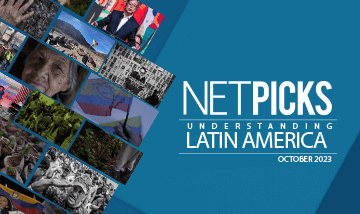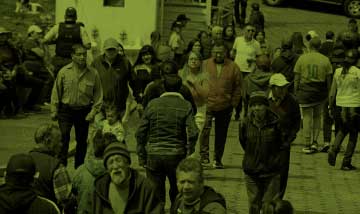Understanding Latin America
Dear readers and colleagues, this month we bring you six articles that reflect the reality of Latin America: one each from Brazil, Venezuela, Colombia, El Salvador and Nicaragua, plus an analysis of the results of the 2021 federal elections in Germany.
-
- “Brazilians are hungry because they have no income”, says João Pedro Stedile
- Venezuela and the U.S. Left at a Crossroads
- Evangelical Churches Against Colombian National Strikes
- There’s Trouble in El Salvador’s Bitcoin Paradise
- Nicaragua: The revolution betrayed
- Breaking Down the 2021 German Federal Election
.
“BRAZILIANS ARE HUNGRY BECAUSE THEY HAVE NO INCOME”, SAYS JOÃO PEDRO STEDILEJoão Pedro Stedile is a major political presence in Brazil and one of the founders of the Landless Rural Workers Movement. In this interview, with the left wing publication Brasil de Fato, he explains that the government of President Jair Bolsonaro is a reflection of both the bourgeoisie and the crisis Brasil has been suffering since 2014. It is only now, he says, that an important segment of Brazilian business is opposing Bolsonaro, although continuing to look for a ‘third way’ (not supporting Lula or Bolsonaro). Meanwhile people are hungry says Stedile; millions are starving and millions more are in a precarious situation because they have no work or money and can’t buy the food they need. The crisis in Brazil is structural, he adds, and goes beyond the current situation and the current government; the economy is over concentrated, and after getting rid of Bolsonaro what is needed is a structural change that will enable the country to guarantee the well-being of the entire population. Stedile downplays rumors of a military coup, talking rather of next year’s elections and the possibility of a national dialogue with the population and the working class about a new direction for the Brazil. This project will not simply depend on a Lula government and political alliances, he adds, structural changes “will (only) happen because of the people’s ability to understand their need to fight for them.” There is no real way forward for Brazil, says Stedile, without controlling financial capital; taking control of the transnational companies; and instituting a wealth tax.”
Interview: José Eduardo Bernardes, Translation: Ana Paula Rocha, September 15th, 2021.
https://www.brasildefato.com.br/2021/09/15/brazilians-are-hungry-because-they-have-no-income-says-joao-pedro-stedile.
VENEZUELA AND THE U.S. LEFT AT A CROSSROADS
There are two principal narratives regarding the situation in Venezuela says the author. For the right, and much of the mainstream media, Venezuela was once a vibrant, thriving democracy that was ruined by Chavismo and socialism. Meanwhile, for many left-wingers the country’s problems have only one source, U.S. economic sanctions, while the government of Nicolas Maduro is viewed as heroically resisting the northern behemoth. Both accounts also portray Venezuelans as having no control over their own destiny, as being forced to choose between two extremes. Other left activists in the country reject this restrictive narrative, as well as both sides of a supposed ‘right-left’ political divide. For example, José Rodríguez Porras, co-editor of venezuelanvoices.org, and co-author of Why did Chavismo fail?, explains that that “…the Chávez and Maduro governments have given political expression to an emergent bourgeoisie. While these governments forged deals with big corporations in oil, gas, and other sectors, they pursued anti-worker policies that undermine independent labor unions and prospects for a living wage for ordinary workers.” According to the author, the situation in Venezuela is dire and Venezuelan activists and movements fighting for worker’s rights, LGBTQI+ rights, women’s rights, and Indigenous rights, deserve the international left’s steadfast support and solidarity. According to the Partido Socialism y Libertad (PSL), a small left-wing Venezuelan political party, rather than trumpet a distorted anti-imperialism to justify support for Maduro, the international Left should align itself with Venezuelan workers..Andy Heintz, September 23rd, 2021.
https://nacla.org/venezuela-and-us-left-crossroads.
EVANGELICAL CHURCHES AGAINST COLOMBIAN NATIONAL STRIKES
Although Colombia is one of Latin America’s conservative Catholicism strongholds, evangelical Christianity is growing exponentially and is overwhelmingly conservative. Over 20 percent of Colombians now identify with different expressions of non-Catholic faith, the fastest growing sectors being evangelical and neo-Pentecostal churches. During the recent major protests these evangelical churches took a generally critical line, emphasizing personal responsibility and submission to authority, whether good or bad; many evangelicals believing that the system is divinely ordained and the real problem lies at the level of the individual soul. Faith in the ‘free market’ has even become synonymous with faith in God, says the author, adding that according to this view “The free-market system is not the problem … but rather the way forward”. This lies in stark contrast to the protestors’ discourse of resistance, which insists that “the system is not only broken, but is actively upholding a political economy of war that relies on violence to function.” The protests continue in the hope that neoliberal policies, anti-democratic fundamentalism and elite rule can be overcome, as the author puts it, “by the forces of peaceful resistance, unbridled creativity, and an unflinching questioning of the status quo.”.Rebecca C. Bartel, September 16th, 2021.
https://nacla.org/evangelical-churches-against-colombian-national-strikesTHERE’S TROUBLE IN EL SALVADOR’S BITCOIN PARADISE
Nayib Bukele, a former member of the leftist Farabundo Martí National Liberation Front (FMLN), turned against his previous party and defeated them as an independent in the Presidential elections of 2019. The ‘cool’, tech savvy, millionaire President became hugely popular, attacking both side of the political spectrum as corrupt and outdated, while at the same time showing signs of authoritarianism. Since then Bukele has acted to consolidate his power, and his new Constitutional Chamber has now cleared the way for him to run for a second term, increasing fears of a possible future dictatorship. The President has remained popular however, at least until now. The spanner in the works is the introduction of Bitcoin to El Salvador, according to Bukele as a way to avoid the high cost of money transfers or remittances that represent the country’s main source of dollars: nearly 25 percent of GDP in 2020. The measure is reportedly unpopular: many are confused about how it works, or whether it will work at all, while others have speculated that using Bitcoin could open the country up to money launderers and foreign mafias. As a result, large crowds took to the streets on September 15th to show their opposition to the President. Opposition to Bukele crosses all political boundaries and includes many with no affiliation, says the author, while pointing out that the protests may provide the left with an opportunity to redeem itself. She adds that “…the FMLN’s viral anti-Bitcoin campaign and notable representation in the recent mobilizations are a reminder that even at its weakest, the party’s territorial reach, resources, and organizing capacity remain unmatched on the Salvadoran left.”.Hilary Goodfriend, September 20th, 2021.
https://www.jacobinmag.com/2021/09/el-salvador-bitcoin-law-nayib-bukele-authoritarianismNICARAGUA: THE REVOLUTION BETRAYED
In the 1990 Nicaraguan general election, Daniel Ortega’s leftist Sandinista government was confident, but the corks stayed in the champagne bottles. Violeta Barrios de Chamorro, widow of a newspaper editor assassinated during a Somoza dictatorship, that the Sandinistas themselves had finally toppled after 40 years, received more votes than Ortega. According to the author “everything suggests that this was the moment Ortega sensed power is not assured in a democracy.” The next Presidential elections take place in November of this year, and this time around Ortega and his Vice Presidente and wife, Rosario Murillo, appear to be making sure they don’t lose: “We are going all out” said Murrillo. “All out” in this case would appear to include arresting opposition politicians and others on the grounds of disloyalty: Ortega’s first Vice President, the well known writer Sergio Ramirez, has left the country under threat of detention. In the recent past “all out” implied brutal repression of the 2018 protests in which 325 people were killed, thousands injured, an undetermined number disappeared, and at least 100,000 exiled. All justified in the name of fighting the Yankee Empire. The nightmare goes on, says the author, who adds that unfortunately “the opposition is fragmented and has not managed to make a convincing and attractive argument for change.”.José Zepeda, September 26th, 2021.
https://www.opendemocracy.net/en/democraciaabierta/nicaragua-the-revolution-betrayed-/BREAKING DOWN THE 2021 GERMAN FEDERAL ELECTION
With the recent elections in Germany, the era of Chancellor Angela came to an end after 16 years at the head of the German State. The victory, although narrow, went to the Social democrat SPD which is now expected to form a coalition, most likely with the Greens and the liberal, free market FPD. For their part, Merkel’s Christian Democrats share of the vote fell below 20%, and they will likely find themselves in opposition; the extreme right AfD (Alternative für Deutschland) while also losing a small amount of ground, managed to consolidate itself as part of the main group of political parties. As for Die Linke (‘The Left’), the vote was somewhat of a disaster; the party did not pass the 5% threshold for entering parliament (Bundestag), only managing to maintain a presence by winning three ‘direct’ seats in Berlin and Leipzig. After a coalition is formally installed, which could take some time, what comes next is dealing with the major issues that received scant mentioned during the campaign: immigration, how to finance the welfare state, the future of the European Unión etc. As for Die Linke, says the author, the party will have to recognize and work through the “mistakes of the last years”, and redevelop itself. What is needed, he adds, is “a strategic centre that could rally party activists behind a strategy that would enable them to persuade voters to support the party’s programme.”Horst Kahrs, September 27th, 2021.
https://www.rosalux.de/en/news/id/45058/breaking-down-the-2021-german-federal-election





